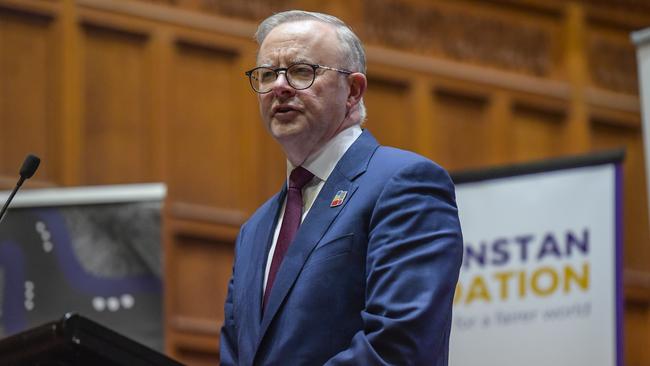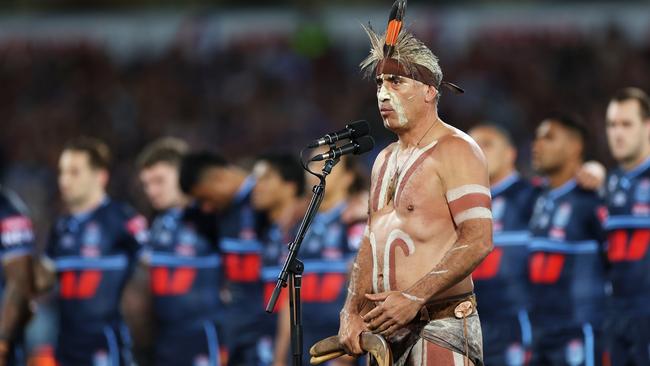Paul Starick: The Voice referendum voters want more detail, not emotion alone
Two Adelaide events that grabbed the national spotlight show why The Voice referendum is at risk of failure, Paul Starick writes.
SA News
Don't miss out on the headlines from SA News. Followed categories will be added to My News.
The plan to give Indigenous Australians a Voice to Parliament is at risk of collapse because of a failure to achieve the double majority required at a referendum to be held within months.
Latest polling shows support for constitutional change remains soft, despite widespread support from corporate and sporting groups, including the AFL, football, cricket and netball peak bodies.
Roy Morgan polling released on Tuesday shows 46 per cent of Australians said they would vote in favour of establishing the proposed Aboriginal and Torres Strait Islander Voice to Parliament if the vote were held today. This was unchanged from a mid-April poll.
“Crucially, there are no states with a majority now in support of The Voice. For a referendum to pass in Australia, a majority of voters around the country as well as a majority of voters in at least four out of the six states must vote in favour of a change,” Roy Morgan chief executive officer Michele Levine said.
The national poll of 1833 voters, conducted from May 26-29, found support for The Voice in South Australia at 47 per cent, up eight percentage points.

Thirty-two per cent said they would vote No, down 18 points, while 21 per cent were undecided, up 10 points.
Pollsters pointed out that experience showed undecided voters were far more likely to end up as a No rather than a Yes.
Support in SA was level with Victoria, behind only NSW (48 per cent), and ahead of Tasmania (42 per cent), Western Australia (41 per cent) and Queensland (39 per cent).
The evening after the polling was completed, Prime Minister Anthony Albanese delivered the Don Dunstan Foundation’s annual Lowitja O’Donoghue Oration, at Adelaide University’s Bonython Hall.
The headline-grabbing lines were Mr Albanese’s calling out of the “great lie” at the centre of the No campaign.
He said Australians would not be asked at the referendum to recognise Aboriginal and Torres Strait Islander peoples as a race but as the First Peoples of Australia.
“Australians won’t succumb to their (the No campaign’s) appeals to fear and their even more ludicrous invitations to jump at our own shadows.
“That’s because Australians have a healthy scepticism of doomsayers, a scepticism kept in good health by memories of all the predictions offered by the Chicken Littles of the past,” Mr Albanese said.

Anecdotally, numerous thoughtful voters have the best of intentions for Constitutional recognition of First Nations people, along with closing the gap on life expectancy and a host of other nationally disgraceful outcomes.
But they believe, rightly or wrongly, that Mr Albanese is attempting to make his case on emotion, rather than evidence.
This raises concerns about backing the weighty step of Constitutional change without believing they are sufficiently informed about the future operations of The Voice and its impact on the workings of government. This is not confined to Liberal voters.
There was some concern about politicisation when Kaurna senior man Karl Winda Telfer conducted a Welcome to Country ceremony at Wednesday night’s rugby league State of Origin game at Adelaide Oval.
“Today we are not about pushing people apart, we are about the union of us all in this great game, in this great country. We need to have the conversations leading up to the end of this year. And I think we are mature enough to make the right call, yeah?” he said.
Even if sport and politics are said not to mix, surely Mr Telfer is entitled to express this opinion.
But the concerns about politicising the ceremony perhaps indicate a reluctance to be pressured into the referendum voting decision.
There is a view among some in the ALP, not expressed publicly, that Mr Albanese might have been better to call on a referendum last year, before the cost-of-living crisis started biting voters so hard and having some question the focus put onto the referendum.
Constitutional change is a big deal. Mr Telfer is right – these conversations are vital.
They need evidence and detail, rather than relying too much on emotional appeals for change.
Originally published as Paul Starick: The Voice referendum voters want more detail, not emotion alone





